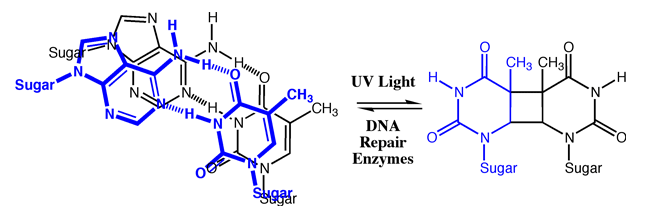
Molecule of the Day: Thymine Dimers and Skin Cancer
UV light causes a crosslink in the DNA

The absorption of UV light by a molecule promotes an electron from a filled orbital, to an unfilled orbital such as a non-bonding orbital or antibonding orbital. This makes the molecule potentially very reactive, and in certain situations can result in new bonds being made between different molecules. This is especially important for certain molecules containing pi bonds such as the DNA bases. In particular, when thymine absorbs UV light, is becomes reactive with an adjacent thymine molecule in the DNA double helix and can lead to formation of a cyclobutane dimer in which the two thymine residues are covalently linked. This makes it impossible for RNA polymerase to make an accurate mRNA from the DNA, so it effectively prevents the cell from being able to use the DNA to make the correct protein or even replicating. Cytosine residues can also form similar crosslinks. The general term used in the literature to describe these dimers is "cyclobutane pyrimidine dimers, or CPDs".
Heavy exposure of your skin to UV light causes many such thymine crosslinks to form in the DNA. Fortunately, we have repair enzymes that can remove the thymine crosslinks and restore the DNA in your skin cells back to the correct sequence.
When you get a sunburn, it is because you have caused more thymine crosslinks than can be repaired, so the cells generally just die. This results in the pain and dead skin you get with sunburns.
However, in very rare cases, the thymine dimers interupt the funcions of just the right genes so that your skin cells become cancerous. In other words, they start growing and do not stop like they should. You get tumors, and eventually the cancer cells invade vital organs and prevent an important function in your body and you could die.
Skin cancer is a games of statistics and luck. The more you expose your skin to UV light, the more likely you are to get the very unlucky combination of thymine dimers in a cell that are not repaired and lead to cancer in that cell. It can tens of years for such a cell to grow and divide into a cancer tumor you can see, but once it does, it becomes deadly.
Bottom line: Casual sun exposure is OK. Sunburns are not. If you get a sunburn, you KNOW that your DNA repair cannot keep up the number of thymine dimers you made. This dramatically increases your risk of skin cancer.
Here are some abstracts of papers that describe the link between UV light and skin cancer:
A paper on cytosine dimers and different wavelengths of UV light.
Here is a good general review of the subject.